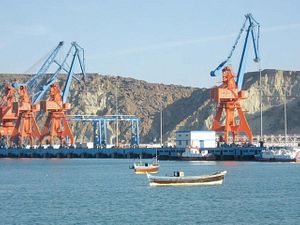In New Delhi’s latest bid to flex its economic muscles, Indian Prime Minister Narendra Modi visited Iran last month and signed an agreement to develop the $500 million Chabahar port. The port, if materialized, would be a gateway for Indian goods into Central Asia. This is indeed a remarkable agreement but every strategic move faces strategic impediments, and Chabahar is no exception. Only 72 kilometers away lies Pakistan’s Gwadar port, which itself holds greater significance and poses tangible economic, commercial, and strategic challenges to Chabahar. Here are five ways Gwadar outflanks Chabahar:
1. Experience: This is the first time India has plunged into a foreign port development venture with such vigor. Chabahar is a geographical reach for New Delhi, since it is not in the Indian Ocean Region (IOR) where India not only has several functional ports (Mumbai, Kolkata, and Goa) but has the shield of Indian Navy also. In Chabahar India would be a guest state, whose borders and territorial waters are at a much greater distance. Moreover, the vessels transporting goods to Chabahar would also be subject to the active monitoring of the Pakistani Navy, which would keep a hawk-eyed watch on the high seas and adjacent international waters. On the contrary, Gwadar is not only developed by China — which has a wealth of experience in overseas infrastructure projects — but the government of Pakistan has handed over the control of port to China. Tehran won’t do the same, at least judging by the existing agreement with India.
2. Security: After Chabahar in Iran, the next stop for Indian goods will be Afghanistan, and then subsequently to the Central Asian states. Although India has enjoyed cordial terms with the successive post-2001 governments of Afghanistan together with its $2 billion investment there, the security situation is inadequate in major areas. Besides, the Taliban, the major insurgent group in Afghanistan has no love for India, since the latter historically supported the anti-Taliban Northern Alliance. Gwadar too is witnessing security issues, since Balochistan province is subject to low-scale belligerency. Still, the scope and extent of separatist brawls in the area have decreased in recent years while many militant groups have voluntarily surrendered to security agencies.
3. The Iran Question: One year after the Iran signed the Joint Comprehensive Plan of Action with the P5+1 states, the deal has not lived up to expectations. Iran recently launched a nuclear-capable missile, violating a UN Security Council resolution (which prohibits any Iranian nuclear launch or test). Further, Supreme Leader Ayatollah Ali Khamenei has vowed that Iran “will not cooperate with America over the regional crisis, Their aims in the region are 180 degrees opposed to Iran’s.” Given this scenario, the prospect of lifting of all sanctions on Iran is again in doubt. The uncertainty regarding sanctions could undeniably have negative consequences for the India-Iran Chabahar deal. Gwadar has no such problems. There are no restrictions on China’s investment anywhere nor is Pakistan subject to any kind of UN sanctions. Furthermore, China holds veto power on the UN Security Council — thus even in the case of a proposed resolution that could impact Gwadar, China could veto the move and continue its economic ventures with Pakistan.
4. The Afghanistan Pressure Point: Despite enhanced Indo-Afghan diplomatic, political, and economic connections, Pakistan’s role and influence in Afghanistan has not withered. Though the central government of Afghanistan leans more toward India, Pakistan has connections with several ethnic groups who represent a major portion of Afghan society. Additionally, Pakistan and China are vigorously working together on the $46 billion China-Pakistan Economic Corridor (CPEC), which culminates in Gwadar. China would not want such a huge investment going to waste. Thus there is every possibility that Beijing and Islamabad join hands to obstruct the political and economic maze of Afghanistan, so as to obstruct India’s dreams of reaching Central Asia. Pakistan could also see an India-Iran covert partnership to cause dysfunction in Gwadar, but Tehran would likely refrain as it is trying to pacify relations with its neighbors and the international community in the wake of 2015 agreement. Any entanglement with Pakistan would also endanger the eastern border of Iran.
5. Partnerships and Rivalries: There is no economic competition between Pakistan and China. Chinese investment in Pakistan is also aimed at boosting trade with the rest of Asia, and Pakistan won’t become a hurdle in China’s quest to reach the Middle East and Persian Gulf . That’s because Pakistan is currently on the receiving end of a huge Chinese investment, which will revamp Pakistan’s feeble economic structure. The infrastructural development at Gwadar at the CPEC in general will help Pakistan to enhance trade with both China and the Middle East, but this doesn’t necessarily mean it would interrupt the flow of Chinese trade and goods to the same destination. However, the Iran-India dynamic is different. After the July 2015 agreement, Tehran is trying its level best to come into the mainstream international arena by accelerating trade in order to put its jammed economic wheel back on track. Iran will not allow India’s Central Asian dream to come true at the cost of Iranian interests.
Whether Gwadar or Chabahar, the developments of both ports can assist millions of people. Gwadar may well hold a slight edge because of its importance and utility, but it can produce best results only when there are no major regional threats. The same goes for Chabahar. Economic cooperation and integration is what’s needed in South Asia and even beyond. That, however, demands enhanced cooperation among all involved parties and the dissolution of all outstanding strategic and political misunderstandings.
Muhammad Daim Fazil is Lecturer of International Relations and Political Science at University of Gujrat, Sialkot Campus, Pakistan. He tweets @DaimFazil.
































